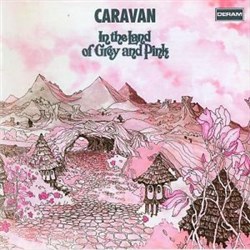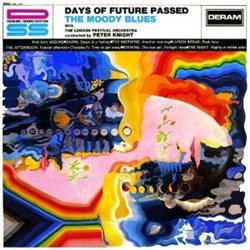
BY HASAN MURAT SÜMER (EE/IV)
hasan.sumer@ug.bilkent.edu.tr
I almost always write about progressive rock, which is not a listener-friendly genre. But there is a kind of song that targets every listener out there: the love song, and the reason for that is stated in the title. In the progressive domain, love songs are pretty uncommon, but they do exist, and they are good. Here, I’ll list some in no particular order:
1) “Lady of the Dancing Water” by King Crimson
This is a two-and-a-half-minute-long, fully acoustic, folky, medieval-sounding tune from the album “Lizard” (1970). It may have a powerful heart-shattering effect, so beware. The rhymed lyrics use elements from nature to first paint an image of how the protagonist perceives his lover; then a break-up occurs, and the remaining lines depict how he remembers his past love. Unfortunately, the vocals are not that good, but the amazing music makes up for it. The flute, played impressively by Mel Collins, is the dominant instrument and creates a deep melancholia. The very simple acoustic guitar in the background harmonizes with the vocals, and from time to time a romantic trombone passage played by Nick Evans enriches the song. To my taste, this is the best among King Crimson’s shorter, softer tracks.
2) “Turn of the Century” by Yes
“And You and I” by Yes is my favorite love song, but it’s been discussed here before, so I decided to go with “Turn of the Century,” from the album “Going for the One” (1977). Here, we see men who rocked hard for years with unbearably complex music composing an elegant, lengthy ballad about loss and reminiscence. In his sharp, crystal-clear vocals, Jon Anderson tells the story of a man who lost his loved one to an illness. He brings her back to life by creating a clay statue of her and relives his memories by walking with her, dancing with her and kissing her, based on either his imagination or his insanity (your call). From the beginning to the middle of the track, a complicated yet beautiful acoustic guitar part accompanies the vocals. In the middle, a piano played in classical style and an electric guitar are introduced, but the change in instrumentation does not disrupt the sad atmosphere. This song is highly suitable for listening to by candlelight.
3) “Running up That Hill (A Deal With God)” by Kate Bush
The amazing singer Kate Bush has contributed lots of love songs to the genre. This song, from the album “Hounds of Love” (1985), was overplayed on the radio in its time, but for today’s younger listeners, the Placebo cover, which has a drastically different style, is more famous. To be fair, the Kate Bush version is more of a disco number than a prog song, but I picked it anyway. Kate sings about a woman’s desire to change bodies with her beloved, so that each can understand the other better from his/her perspective. She is very successful in expressing the feelings of a passionate lover. The music pretty much consists of a relentless beat, some clever synthesizer arrangements and Kate’s wordless backing vocals. Unexpectedly, this song works well as background music for studying (for me, at least).
4) “Golf Girl” by Caravan
 Musically, this song from the album “In the Land of Gray And Pink” (1971) has nothing to do with the standard understanding of a love song. Caravan is a master of writing silly lyrics (and giving songs silly names). Here, they tell a story about a love born on the golf course, involving the protagonist and a girl who sells cups of tea. The song is very enjoyable, with a lot of instruments to listen to, including the trumpet, flute and mellotron. I’m not really sure how I can describe the music, so I’ll just say it’s filled with funny and original ideas. Another song on the same album, “Love to Love You,” is similar in style.
Musically, this song from the album “In the Land of Gray And Pink” (1971) has nothing to do with the standard understanding of a love song. Caravan is a master of writing silly lyrics (and giving songs silly names). Here, they tell a story about a love born on the golf course, involving the protagonist and a girl who sells cups of tea. The song is very enjoyable, with a lot of instruments to listen to, including the trumpet, flute and mellotron. I’m not really sure how I can describe the music, so I’ll just say it’s filled with funny and original ideas. Another song on the same album, “Love to Love You,” is similar in style.
5) “Nights in White Satin” by The Moody Blues
The single version of this extremely famous piece is responsible for the existence of an entire generation of people. The album “Days of Future Passed” (1967) is considered by  some to be the first progressive rock album, and the album version of this song runs significantly longer, thanks to the addition of an orchestral section at the end and the poem that follows: “Late Lament,” whose verses are beautifully written. The part of the song contained in the single version has a much more commonly used structure than what is found in the other songs discussed in this column. The lyrics are targeted at a beloved one, with whom the protagonist is not in a relationship. The chorus, consisting of four “I love you” lines and a flute solo by Ray Thomas, does not need description, since it is the reason for the song’s fame. A true timeless classic…
some to be the first progressive rock album, and the album version of this song runs significantly longer, thanks to the addition of an orchestral section at the end and the poem that follows: “Late Lament,” whose verses are beautifully written. The part of the song contained in the single version has a much more commonly used structure than what is found in the other songs discussed in this column. The lyrics are targeted at a beloved one, with whom the protagonist is not in a relationship. The chorus, consisting of four “I love you” lines and a flute solo by Ray Thomas, does not need description, since it is the reason for the song’s fame. A true timeless classic…
This will be little late by the time this biweekly column is in print, but R.I.P. Keith Emerson.
